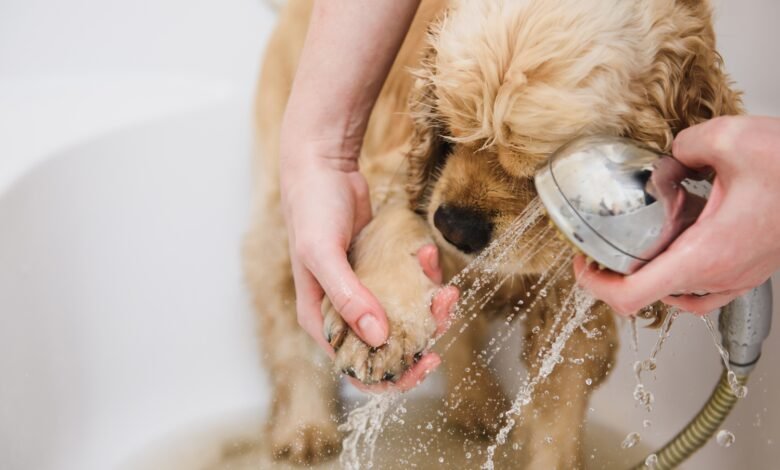
Grooming Tips for Your Pet During the Summer 2023
As the temperature starts to rise during the summer, it’s essential to keep your pet’s grooming needs in mind. With a little extra care and attention, you can ensure that your furry friend remains comfortable, healthy, and happy throughout the season. In this article, we’ll discuss some practical grooming tips that will help you maintain your pet’s well-being during the summer of 2023.
Importance of Grooming Your Pet During Summer
Grooming your pet during the summer is crucial to their overall health and well-being. The hot and humid weather can cause your pet to sweat more, leading to a buildup of dirt, grime, and oils in their fur. This buildup can make your pet’s coat look dull and matted, which can be uncomfortable for them. Regular grooming helps remove this buildup, keeping your pet’s coat clean and shiny.
Grooming also helps prevent skin irritations and infections. Parasites such as fleas and ticks are prevalent during the summer, and they can cause skin irritation and even transmit diseases to your pet. Regular grooming helps you detect any signs of infestation early on and prevent them from spreading.
Read More: Grooming Tips for Your Pet During the Winter
Grooming Tips for Your Pet During the Summer

Summer can be a challenging time for pets, as they can easily become overheated, dehydrated, and prone to parasites. Grooming is an essential part of keeping your pet healthy and happy during this season. With proper grooming, you can ensure that your pet’s coat remains clean and shiny, their nails are trimmed, and their ears are free of wax and debris.
Brushing Your Pet’s Coat Regularly
Regular brushing is essential to keep your pet’s coat clean and free of tangles and mats. It also helps distribute natural oils throughout their coat, keeping them healthy and shiny. During the summer, it’s recommended to brush your pet’s coat at least once a week to remove any buildup of dirt, grime, and loose hair.
If your pet has a long coat, you may need to brush them more frequently. Use a slicker brush or a comb to detangle any knots or mats gently. Be sure to brush in the direction of the hair growth to avoid pulling or damaging the hair.
Bathing Your Pet
Bathing your pet during the summer is essential to remove any dirt, grime, or sweat buildup from their coat. However, it’s crucial to avoid over-bathing your pet, as it can strip their coat of natural oils and cause skin irritation.
It’s recommended to bathe your pet once every four to six weeks, or as needed. Use a mild, pet-friendly shampoo and warm water to lather your pet’s coat gently. Be sure to rinse thoroughly to remove all traces of shampoo.
Keeping Your Pet’s Paws Clean
Your pet’s paws are exposed to a lot of dirt, dust, and debris during the summer. Regular cleaning can help prevent infections and irritation. After taking your pet for a walk, wipe their paws with a damp cloth to remove any dirt or debris.
Read More: 5 Health Tips for Your Pet
Trimming Your Pet’s Nails
Long nails can be uncomfortable for your pet and can even cause them to walk awkwardly. During the summer, your pet’s nails may grow faster due to increased outdoor activity. Trimming your pet’s nails regularly can prevent them from becoming too long and causing discomfort.
Use a pair of nail clippers designed for pets and trim only the tip of the nail. Be sure to avoid cutting the quick, which is a blood vessel that runs through the nail. If you’re not comfortable trimming your pet’s nails, consult a professional groomer or veterinarian.
Cleaning Your Pet’s Ears
Cleaning your pet’s ears during the summer can help prevent ear infections and reduce the risk of parasites. Check your pet’s ears regularly for any signs of redness, swelling, or discharge. Use a pet-friendly ear cleaner and a cotton ball to gently wipe the inside of your pet’s ears.
Be sure not to insert anything into your pet’s ear canal, as this can cause injury or infection. If you notice any signs of infection or discomfort, consult a veterinarian.
Protecting Your Pet from Parasites
Parasites such as fleas, ticks, and mosquitoes are prevalent during the summer and can transmit diseases to your pet. Regular grooming, along with preventative measures such as flea and tick medication and mosquito repellent, can help protect your pet from these parasites.
Consult your veterinarian for the best preventative measures for your pet’s specific needs.
Preventing Overheating
Pets can easily become overheated during the summer, especially if they spend a lot of time outdoors. Signs of overheating include panting, excessive drooling, lethargy, and vomiting. To prevent overheating, provide your pet with plenty of shade and water, and avoid leaving them in a parked car.
Importance of Hydration

Hydration is crucial for your pet’s health and well-being during the summer. Make sure your pet always has access to fresh, clean water, especially during outdoor activities. You can also offer your pet frozen treats or ice cubes to help keep them cool and hydrated.
Related FAQs
- How often should I bathe my pet during the summer? It’s recommended to bathe your pet once every four to six weeks or as needed.
- How often should I brush my pet’s coat during the summer? It’s recommended to brush your pet’s coat at least once a week to remove any buildup of dirt, grime, and loose hair.
- Can I trim my pet’s nails myself? Yes, you can trim your pet’s nails yourself, but be sure to use nail clippers designed for pets and avoid cutting the quickly.
- How can I protect my pet from overheating during the summer? Provide your pet with plenty of shade and water, and avoid leaving them in a parked car.
- How often should I clean my pet’s ears during the summer? It’s recommended to check your pet’s ears regularly for any signs of redness, swelling, or discharge and clean them as needed.
Conclusion
Grooming your pet during the summer is essential to their overall health and well-being. Regular brushing, bathing, paw cleaning, nail trimming, and ear cleaning can help prevent skin irritations, infections, and parasite infestations. Additionally, protecting your pet from overheating and ensuring they stay hydrated is crucial during the hot summer months.
By following these practical grooming tips, you can help your furry friend remain comfortable, healthy, and happy throughout the summer.
Read More: Best Tips For Pet Care in 2023








4 Comments